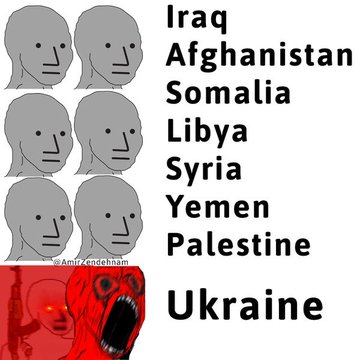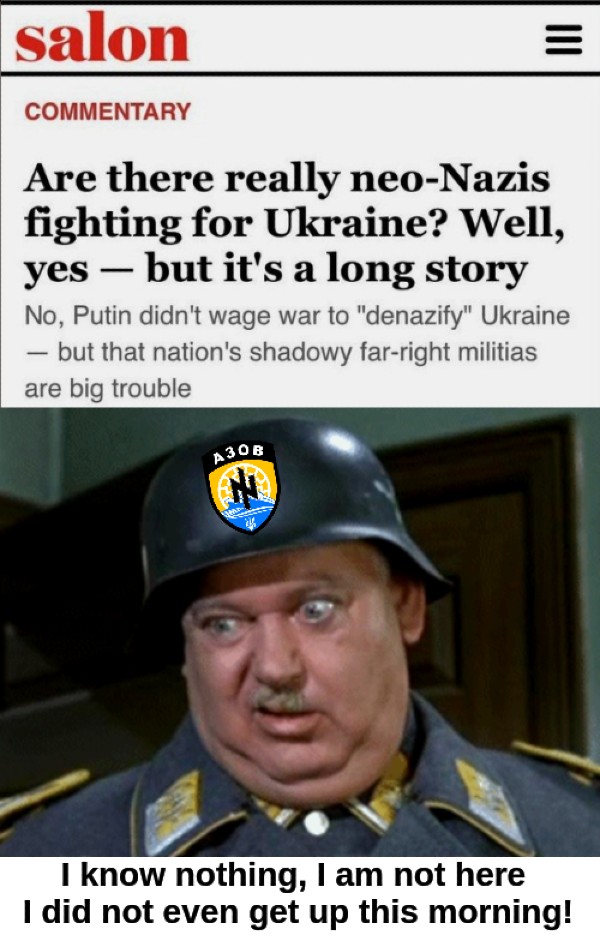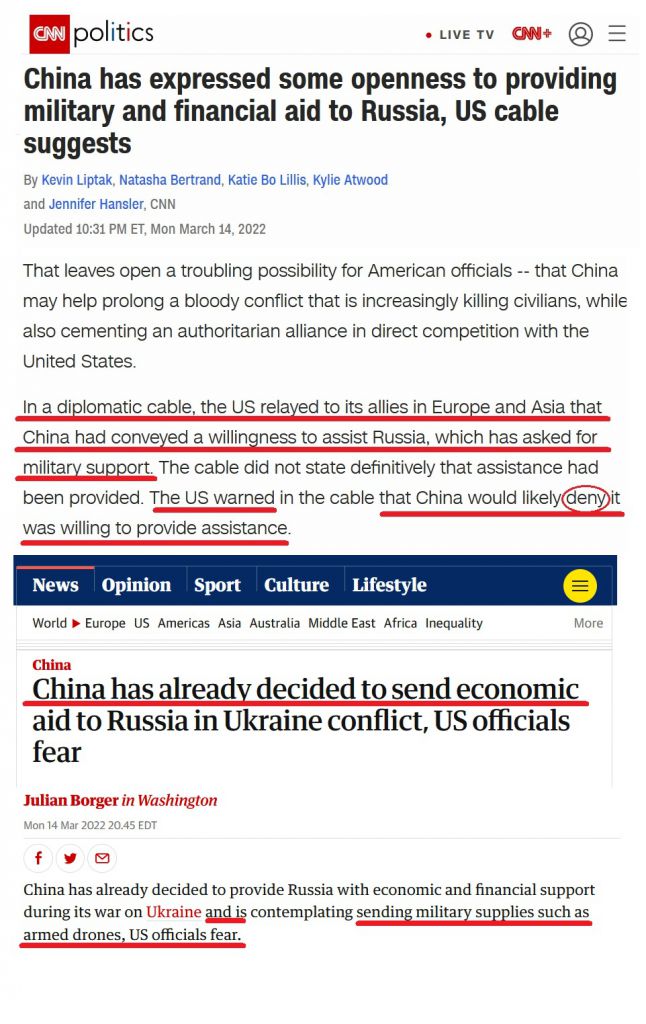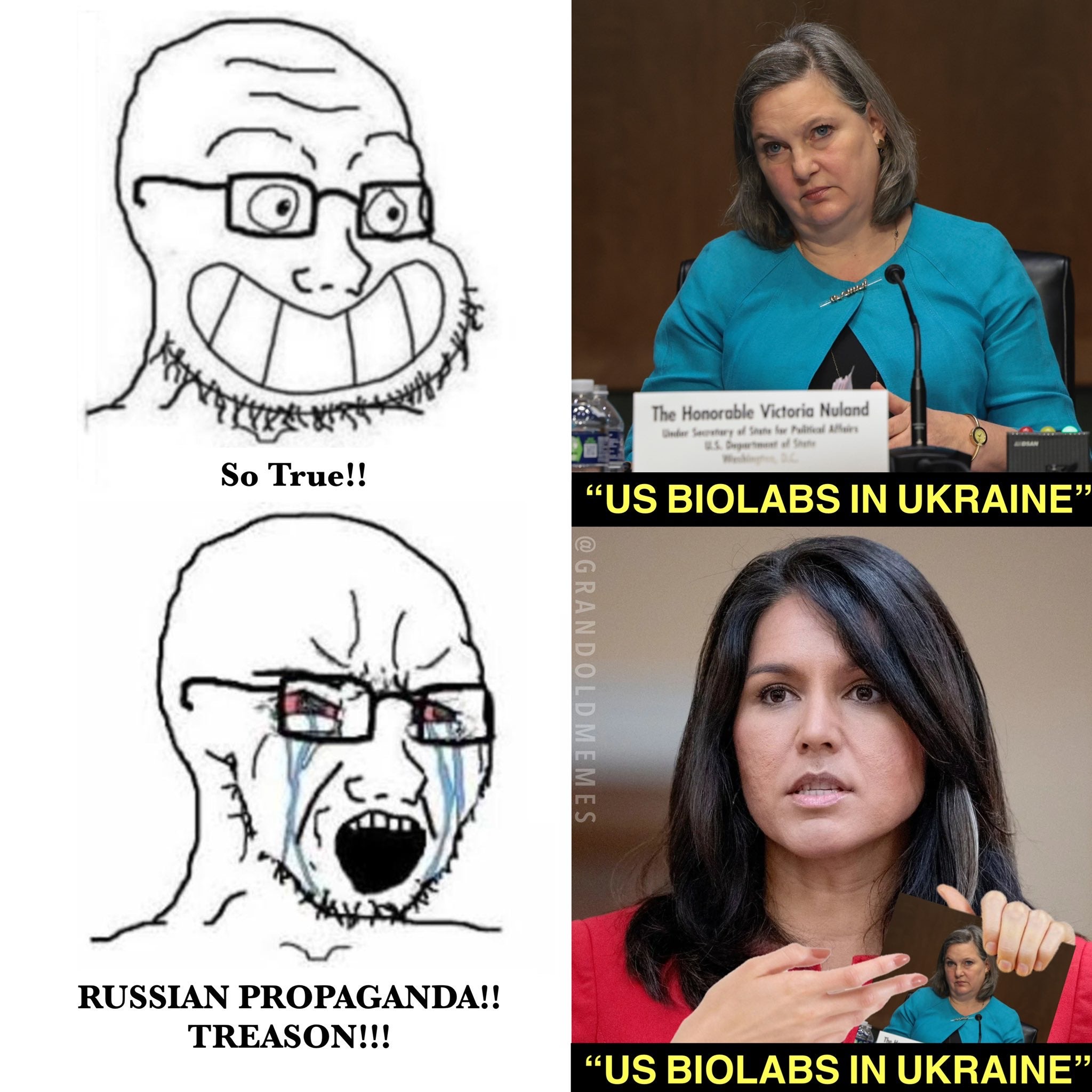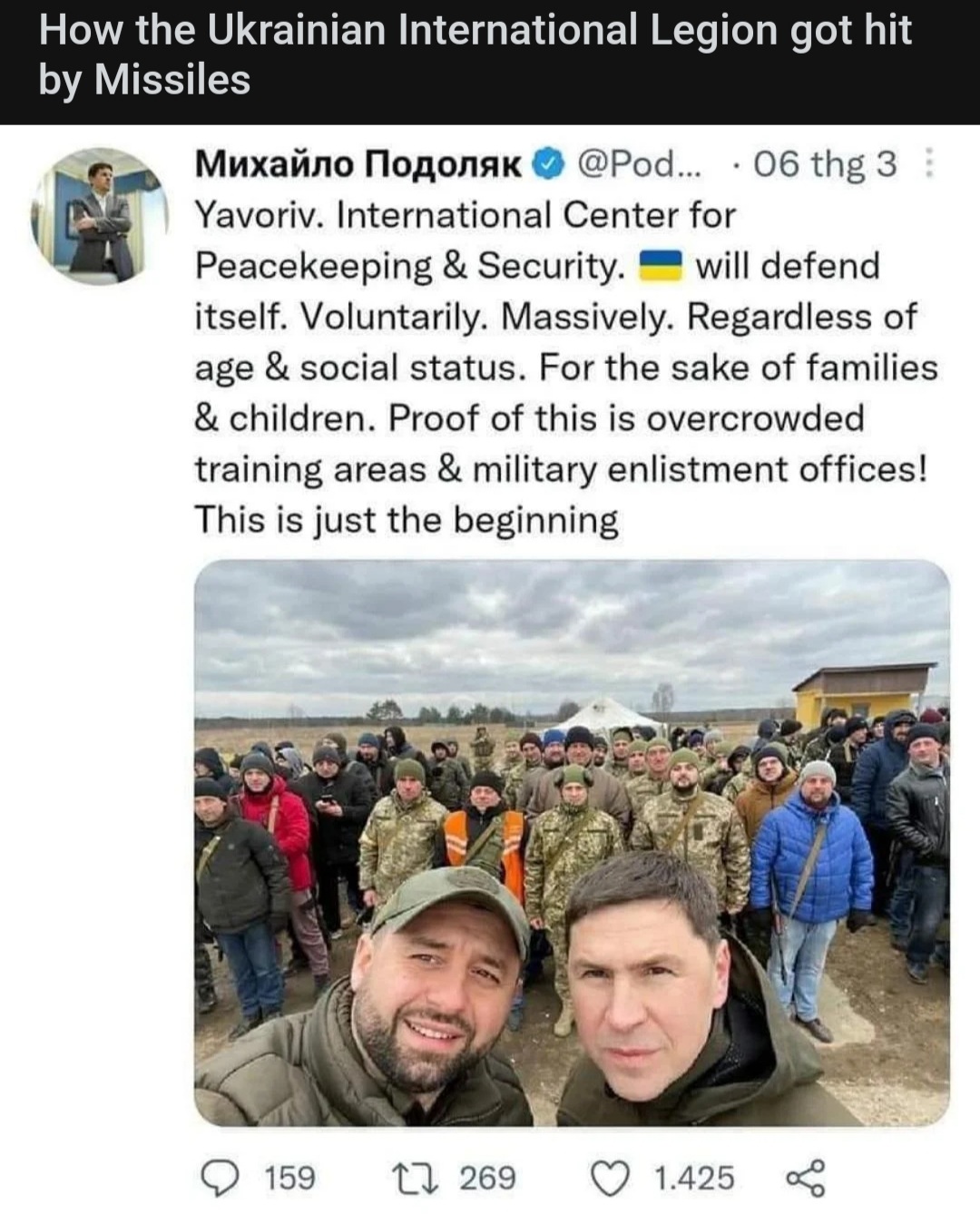the larpers!i have seen similar, mostly the same guy's story...and saw another about a group assembled in a school gym that got hit.
apparently, larpers in the gym were posting on some kind of social media, and the russians either tracked their location from their posts, or maybe tracking their phones.
Join the Hide community
Get access to live stream, lessons, the post exchange, and chat with other snipers.
Register
Download Gravity Ballistics
Get help to accurately calculate and scope your sniper rifle using real shooting data.

Install the app
How to install the app on iOS
Follow along with the video below to see how to install our site as a web app on your home screen.
Note: This feature may not be available in some browsers.
You are using an out of date browser. It may not display this or other websites correctly.
You should upgrade or use an alternative browser.
You should upgrade or use an alternative browser.
Is something going on in Ukraine?
- Thread starter Cardboard55
- Start date
- Status
- Not open for further replies.
the larpers!bwahahaha! so true.
Hey stanamire, you thinking what I’m thinking? Idk what? There’s a basket ball game tonight?
I guess I'm a hypocrite because I also agree with this; because "we" allowed the farce to happen in Nov 2020. OOOops, I guess DHS is going to break own my door now. Thought and word police are now part of the agenda. Me thinks the founders would have already shit and gotten off the pot.comedic
Ukraine isn't innocent and is as corrupt and plagued as the mid east countries. As for the history of the region, I've a good grasp on it. That said, no one said the people should be shelled and skull dragged, read what was written again. Also, yeah, America is getting exactly what she deserves as we get the gov't we deserve through inaction and care outside our own driveways.
There is a certain credence that would say..well, you all allowed this to happen so you get what you deserve; but, is that what We the People want for the USA?
exactly. many people who love Ukraine, hate Putin because of the "laws against the corruption of minors" which prevent homos from recruiting and corrupting kids.....
and of course you have the satanists who hate Russia for the "anti-blasphemy laws"
Russia is very pro Christian and pro traditional morality. Check this out:
Big negative on that one. I lived there for quite a while, in multiple cities, have studied the region and history all my life since my family is from Finland.
Russia is basically a medieval knightdom that had intermittent and limited exposure to the stages of the industrial revolution because it’s land-locked and frozen almost year-round. It’s a very gloomy, depressed place after being ruled by regional warlords, invaded by everyone from Genghis Kahn to Hitler, and subverted by secular statists with the Czars, demonic apostates under a communism dictatorship, with a hybrid black market/centrally-planned economy trying to hold it all together. Now it’s under rule by former KGB oligarchs who confiscated all the most lucrative industries that survived the collapse, namely the oil, natural gas, and mining enterprises.

They used to have large families pre-Soviet times in the peasant farming villages, but with industrialization under Soviet Socialism, millions were aggregated in the cities under the Czarist attempts at industrialization, then the apartment complexes in the Krushchev era, and those apartments are still standing to this day, utter eyesores if you’ve ever seen one. They were only supposed to last 5 years until better solutions could be hatched by "glorious people’s revolution” in the wake of purging the system of talented designers, construction professionals, brokers, and other “bourgeois” class who ended up dead or in gulags.


When they did have traditional farming families and the dominance of the Russian Orthodox Church since 1721, it was still a depressed society with no real vigor or piety in them, just the reservation to living a simple life condemned to the long winters and hope that a strong leader would navigate them through the border troubles with rival empires. Under Peter the Great, the Russian Orthodox Church was made subordinate to the Czarist state as a functionary for managing the populace, much as was done with Roman Catholicism in Central Europe hundreds of years prior to that.
When the Godless apostate communists were financed by Germans and international banks to get Russian empire troops out of Central Europe during The Great War, the Czars even contributed to their own demise by penetrating the Bolsheviks in attempts to co-opt them to get control of the various revolutionary movements that had sprung up in the late 1890s. If you study the history of Okhrana (Czarist-era secret police), they were agent provocateurs inside the Bolsheviks well before 1917.

The Bolsheviks targeted the Russian Orthodox Church and initiated a campaign of mass executions, extrajudicial killings of priests and clergy. Lenin spoke out against Okhrana’s tactics, then embodied their exact same methods when they became the Communist Cheka, MVD, and NKVD secret police during and after the Russian Civil War. Survivors of the purges and murders of Russian Orthodox Church were subverted as collaborators with the Bolshevik revolution to act as spies and hubs to keep track of the citizenry, after the Bolsheviks accused the ROC of supporting the White Nationalist Russians who wanted to retain the Czars.
The upper class had some more traditional values in the autocracy, while the peasant slavs were subsistence farmers transitioning into labor factories. One of the main calls to action and agitation by the revolutionaries was labor conditions, but there was a lot of propaganda with this messaging at the time that drove public perceptions not only in Russia, but in Europe and the US as well.

If you’re trying to find a puritan-style farming family life in Russia, it’s just not a reality I’ve been able to find historically, and is uniquely a US thing. One exception would be in Ukraine under Prussian-born Czar Katherine II, when Mennonite farmers moved into Western Ukraine to harvest the land and live there, after being subjected to religious persecution in Prussia and Poland in the mid 1700s. Katherine II invited them in with incentive decree from 1763-1764. These are from the Anabaptist movement who were persecuted by the major church-states at the time, who were utterly corrupt.
During the Soviet Times, the ROC became an arm of the state, similar to how it had under Peter and the Czars, but now under communist rule. Once Yeltsin announced Putin was surprise, the new President on Dec 31, 1999, Putin worked to create an image of being aligned with the ROC, but it was business as-usual.

When I lived with Cossacks for a week, who are their devout warrior class with their own monastery-like communities, they were watching Russian gangster movies in the communal eating room with all of its old metallic icons on the walls, reminiscent of medieval times pre-Renaissance from an art perspective. We went to mass at a local ROC church building in the town early one frozen morning and did the sign of the cross for 2 hours like a PT session, with a few older babushkas and people that still went to church, filed through past the priest at the end to kiss a giant golden cross, before heading back to the monastery. It was an interesting experience and I didn’t fully appreciate who I was even living with, not being as familiar with the Cossack traditions as I should have been.
The head Cossack running the place was some type of intel guy and a local police officer as well for his day job. They relied on food donations from the local community, so chow was pretty sparse but enough to sustain you. I actually would have liked to stay with them longer just to get more familiar with them.
But I didn’t see any evidence of devout Christians as we would recognize them in the US. Catholics would be more able to relate with them and see a common apathy at best, with minimal mass attendance/lack of interest. I’m not judging anyone, just pointing out exactly what I experienced to the best of my ability.
If you see propaganda talking about Putin as some type of Christian crusader against globalists, it doesn’t pass the sniff test.
Last edited:
Nazi militias is Russian propaganda designed to sway Western observers and European nations from hesitating to support Ukraine.the AFU is using schools and hospitals as military staging areas so they don't get bombed.
In Mariupol they are using the population as human shields and shooting them if they try to leave the cauldron.
this is not "russian propaganda" the AFU and it's nazi militias carried out some horrible reprisals in Mariupol when they tried to break away and declare independence in 14. Some unspeakable things were done there that the USA gave them a total pass on. So the idea that Russia is going to deliberately murder pro-russian civilians while the AFU is carefully trying to protect those same pro-russian civilians that they terrorized for years - well, it's not credible. It's bullshit. It's propaganda. They are blaming Russia for the very things that they are doing themselves.
Imagine the priority list of the Ukrainian government trying to work to wards normalizing trade with the EU:
1. Release the Nazi battalions
2. Start attacking ethnic Russians in Donbas
Yeah, that will really help get more accepted by the Germans, Belgians, French, and EU Parliament!
Or let’s take another look at this from Putin’s perspective:
Your puppet Yanukovych has been rejected by Ukraine after he signed onto your CIS economic commonwealth idea, whisked away by Spetsnaz after 4 months of Euromaiden protests against him and Kremlin influence in Ukraine. You needed Ukraine more than any other nation to make the CIS work, but now it’s not looking good.
1. Activate the false flag, masked Nazis posing as Ukrainians, and go attack ethnic Russians in Donbas.
2. Now that those Ukrainian Nazis have attacked the poor ethnic Russians (who were just living their lives and are pons for the Kremlin as well), you can claim war crimes against civilians.
3. Send in Russian units as peacekeepers against the Nazi terrorists, using the same language NATO did for Balkans in early 2014.
4. Annex Crimea, which has had ethnic Russians moved into it after genocidal campaigns for centuries to remove its historic inhabitants.

There’s a ton of abstentions though.weird that only 2 countries voted against this.
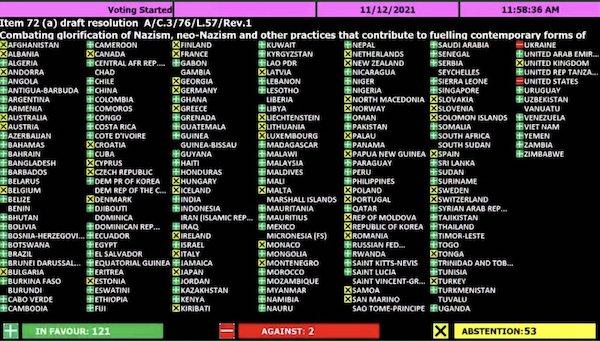
weird that only 2 countries voted against this.

I would be curious on what the exact wording of the resolution is. Sometimes, a resolution, act, bill or rule has a title that sounds great but the exact language is full of bad things.
i think this was a russian driven vote to expose ukraine and force them to disavow the neo-nazis, but they can't.There’s a ton of abstentions though.
if the nazis didn't exist, congress wouldn't have had to vote to stop funding them (which they reversed).
Thats what I thought that the Russians are losing because Ukraine is starting to look like the surface of the moon. Power ,water and food is cutoff in Ukraine millions of people fled the country those who stayed are being killed. Petraeus your assessment of the war mimics Biden's shorts .... shitty.Is General Petraeus trying for a cabinet position now?
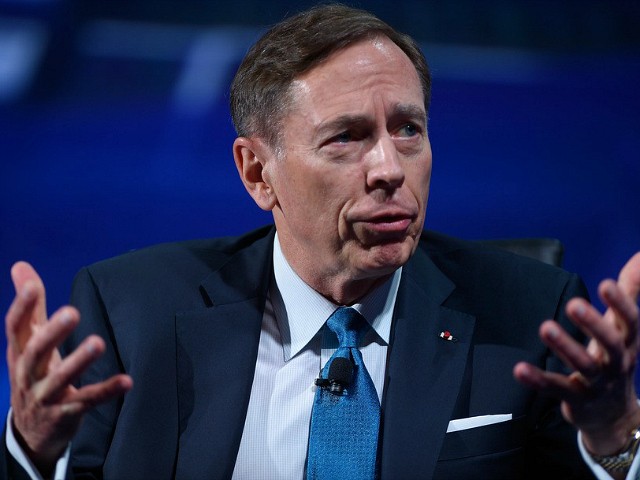
Petraeus: 'The Russians Are Losing Because We Are Strangling Their Economy'
Former CIA Director David Petraeus on Sunday weighed in on the ongoing Russian invasion of Ukraine. | Clipswww.breitbart.com
And….. what’s the point?Fox , cough cough, news is reporting that the pregnant woman and child have died from their injury
View attachment 7827390
she will get more coverage than 2 dozen dead americans at a xmas parade.And….. what’s the point?
Euromaiden protesters were protesting being subjugated by another Putin puppet, Yanukovich.So its okay for the city of Kiev to rise up and riot violently for 3 months with EU NATO backing. But, When a segment of the population in the far east rises up and looks to their Russian backing its wrong?
Crimea shifted hands with little violence because the majority of people supported it. When the east, yes with Russian backing started to rise and resist the coup... they are the baddies? Eu and Nato have been pushing weapons and training into Ukraine too.
I think most people are looking at it not my problem. Eastern Europe is not my home, while I will pay attention, as our idiot fucking leaders could lead us further into despair here... I don’t have a dog in this fight. I’m just sitting back eating popcorn.
Curious in 2020 when riots broke out across the country and looting and destruction of private property ran rampant... which side where you on? The looters or Kyle Rittenhouse? The summer of mostly peaceful protests countered by the January 6 incident. Which side if any do you fall on?
Imagine we had a Russian puppet in the WH “elected” after a rigged election (hmmmmmm).
The Ukrainians did more to overthrow their puppet Russian president and sent him back to Russia in Feb 2014.
Biden is also a Russian puppet and has been since no later than 1972 when they financed his campaign into the Senate in Delaware as part of the Active Measures campaign to fill the Senate with secretly-compromised politicians, so they could get the US to sign pro-Soviet legislation that would further disarm the US (SALT II treaty-Joe Biden was its biggest sponsor). The reason for this was because the Senate is the International Treaty Signatory body of the US Congress.
Crimea has been depopulated and replaced with ethnic Russians for moments like this in history, over a period of centuries.
I am very much in the Kyle Rittenhouse camp.
The rioters in the US were part of the Soviet BLM/ANTIFA movement, which is an evolution of the former SDS/Weathermen Underground, which Bill Ayers was a member of if you recall. Comrade Obama launched his political camping from Comrade Ayers’ apartment.
Trump sent Javelins to Ukraine as a deterrent after Putin invaded with Obama’s blessing in 2014.
If you understand the history and who all the actors are loyal to, it will make sense, but it takes some studying.
But when you look at 2013-2014, the Ukrainians absolutely had more stones than the US and forced their Kremlin puppet out. Since the Soviets co-opted the FBI, CIA, DoD, who knows how much of Congress, the Senate, etc. from the 1930s-present, they have a lot of infrastructure within the US to squash any uprisings against the mass of traitors in DC, and use the IOJ-Mockingbird media to discredit anyone who is actually pro-American.
"the guy"Well at least the guy in the bottom photo got dirtied up a bit for the photo. The woman in the picture has clothes on that look a little too clean for a DP. Where's the blood? Surely they must have some bottles of ketchup over there.
LOL
"the guy"
LOL
I think that I see it now. Eddie Murphy from the movie, "Trading Places." Correct?
It's been a long time since I've watched the movie.
Do I get a mulligan?
Should have replied "I can see!"I think that I see it now. Eddie Murphy from the movie, "Trading Places." Correct?
It's been a long time since I've watched the movie.
Do I get a mulligan?
Big negative on that one.
I see your multiply novels that you wrote to my posts, and I do not have the time to read through and evaluate them fully as they sit, not unless someone wants to pay me to do so.
In the skimming that I did, I see some things that you wrote which I absolutely agree with, some things that I do not disagree with, and some conclusions which are just ridiculous and outlandish.
So if you want to focus on one or two points instead of one or two hundred points, I'll try to engage with you, although it will have to be after my 12 hour day tomorrow.
I too have quite a bit of background regarding Russia. Educationally, with my history degrees; professionally, with the time I spent over there; and also with relations and numerous friends, since such people tend to network and associate together continually. I don't know of a single Russian who would agree with your argumentative Finnish perspective, but I know a few American Russians who might, now that they have been subjected to MSM propaganda here in the West for so long. And yes, I currently have friends who would be shooting each other if they lived there instead of here, so I have been well exposed to both perspectives for the last 7 years on this matter; the Ossetian war before that, and the Chechen issue prior.
Edit - after reading ahead to your next post, I see that you are just a cunt who cuts and pastes Wiki articles. You are not worth any response.
Last edited:
Moscow was fortified by Kievan Rus Yuri Dolgoruki, so Moscow is really Kiev’s ancestral territory if you go by that.

A lot of you guys looking for a neat and tidy little package to wrap your heads around this subject can’t have that easy pill solution, because it doesn’t exist. You really need to understand far more about the history and region before you can even begin to catch up to the events over the last 100 years.
Russian false flag operations commenced in 2014 on Donbas after Ukrainians ousted Putin’s puppet, Yanukovich, who went against the will of the people by signing onto the new Russian Economic Union that Putin proposed to be his answer to the Eurozone.
Saying that Ukrainians deserve to be shelled and skull-dragged by Russia for having a history of corrupt Kremlin puppets installed over them means that you also are OK with the same being done to you for electing a geriatric pedophile, whose son was eyeball-deep in the Russian plot to control energy in Ukraine with Burisma, which his kiddy-diddler father openly bragged about getting Viktor Shokin fired over to stop the investigation.
Ukraine after Putin Puppet Yanukovich was ousted, was trying hard to get their industry and government above-board enough to be on favorable trade status with the EU. Obama and Biden helped Putin kill that effort, and now you pass judgement on all of Ukraine for this.
Some of you should really not post until you educate yourselves on the facts and history of the region. It’s especially bad when you have zero knowledge of the geography and demographics, but are using after-the-fact social media memes to form your opinions.
If you follow the timeline, a very good understanding of this series of events will unfold before you, and you will be able to sift through disinformation much better. Disinfo and propaganda are normal actions from all sides in conflict, nothing new. You just see more of it in the Information Age.
Can we straighten out our own shit before I give a crap about Ukraine?
For you Americans with history measured in decades it might be difficult to grasp complexities (and pathology if you like) that emanate from being thrown into various situations as a nation. Just a few examples:But doesn’t this conflict go back to a feud between some Denisovans and
Neanderthals?
Fighting over some mammoth hunting grounds or something?
Russians formed as a minor tribes being on the doorstep of Europe in harsh environment fighting for survival many times losing,
Serbians living ~500 years under Ottomans having your neighbors being converted to islam, children taken and converted with them coming back and killing their own
Ukrainian farmers having to pay industrialization of Soviet union with their lives by growing crops just to die from hunger under the terror of Communists etc...
So yea a lot of national character comes from history and patos that comes with it and having things black and white is luxury you have (or better yet have had...).
Outside some crazies posting here hypocritical double standard bullshit which is waste of time replying to in general if you apply same standards to everyone the solution is pretty clear.
Public vote in all "oblasts" and if % to secede is positive simply part ways. There were plenty of other proposed solutions under Minsk framework but that was then and now is now.
I think its clear to all that upper paragraph is the least desired outcome for practically everyone and the price is blood of people (as always).
Unfucking believable.
Some of y'all are trying to prove your education by writing big long history of two areas divided by an imaginary line on a map and coming up with some bullshit to the current events.
It's got nothing to do with two hundred year old history. It is about events of the last twenty years.
Here's a picture to make it simple.

The USA and the EU were exploiting the orange area and teasing to turn it light blue. Arms, biolabs and a corrupted government on their border. Nothing more nothing less.
There was an agreement with the USA/NATO for a buffer zone and you can see that was broken. What would we/the USA be doing if that was happening to our southern border?
Some of y'all are trying to prove your education by writing big long history of two areas divided by an imaginary line on a map and coming up with some bullshit to the current events.
It's got nothing to do with two hundred year old history. It is about events of the last twenty years.
Here's a picture to make it simple.
The USA and the EU were exploiting the orange area and teasing to turn it light blue. Arms, biolabs and a corrupted government on their border. Nothing more nothing less.
There was an agreement with the USA/NATO for a buffer zone and you can see that was broken. What would we/the USA be doing if that was happening to our southern border?
Yes we need to get our sh-t in order for sure. Seeing this and the way our Government over many years, decades even and how it has added to the misery is important. I believe our time is rapidly approaching and we are going to have deal with our own catastrophe right here.Can we straighten out our own shit before I give a crap about Ukraine?
The only thing to add is that the US helped cause it by having a weak administration at the helm and Putin saw his chance.Unfucking believable.
Some of y'all are trying to prove your education by writing big long history of two areas divided by an imaginary line on a map and coming up with some bullshit to the current events.
It's got nothing to do with two hundred year old history. It is about events of the last twenty years.
Here's a picture to make it simple.
View attachment 7828123
The USA and the EU were exploiting the orange area and teasing to turn it light blue. Arms, biolabs and a corrupted government on their border. Nothing more nothing less.
There was an agreement with the USA/NATO for a buffer zone and you can see that was broken. What would we/the USA be doing if that was happening to our southern border?
FIFY
Unfucking believable.
Some of y'all are trying to prove your education by writing big long history of two areas divided by an imaginary line on a map and coming up with some bullshit to the current events.
It's got nothing to do with two hundred year old history. It is about events of the last twenty years.
Here's a picture to make it simple.
View attachment 7828123
The USA and the EU were exploiting the orange area and teasing to turn it light blue. Arms, biolabs and a corrupted government on their border. Nothing more nothing less.
There was an agreement with the USA/NATO for a buffer zone and you can see that was broken. Whatwouldshould we/the USA be doing if that was happening to our southern border?
Its not going as well as they taught but when it comes to losses we are again taking the Ukrainian version of ''Comical-Ali'' and ''unnamed officials'' at their word, yes they have generals on front lines instead of corporate boards at Raytheon or LM , when they lose troops they always lose generals ,its just the way they roll. 3 down so far.
In any case, if one would believe Ukrainian propaganda where MSM is taking Comical Ali's statements as gospel ,it seems like Ukrainians are at minimum besieging Moscow not the other way around where the Ukrainian president is making statements in front of a green screen while sipping margaritas somewhere in EU
View attachment 7826668
The invasion of Iraq took around a month and the country was already bombed out and with no-fly zones for a decade prior. With numbers of Javelins and NLAWS supplied to Ukraine, drive up to Bagdad would be far deadlier even with the incompetent Arabs with little will to fight.
US and NATO troops will die sometime down the line as Russians will return the favor the first chance they get that is 100% certain, it wouldn't surprise me if they actually supply some of these same weapons which they are now capturing in numbers . So maybe a couple of years from now when narcos in Mexico shot down border patrol or DEA helo it might just be with the tube supplied to Ukraine.
Meanwhile inept geriatrics at the helm
Russian military jet? Really? GTFO! That is a vintage, circa late 1960's, Mig-21. Russia never had the Mig-21 in service. The late USSR did. For crying out loud! They think most people are dumb and stupid, and at least they have that right.
ROFL!! That's Eddy Murphy in the bottom picture. 1980's movie "Trading Places"
Another poorly staged photo op.
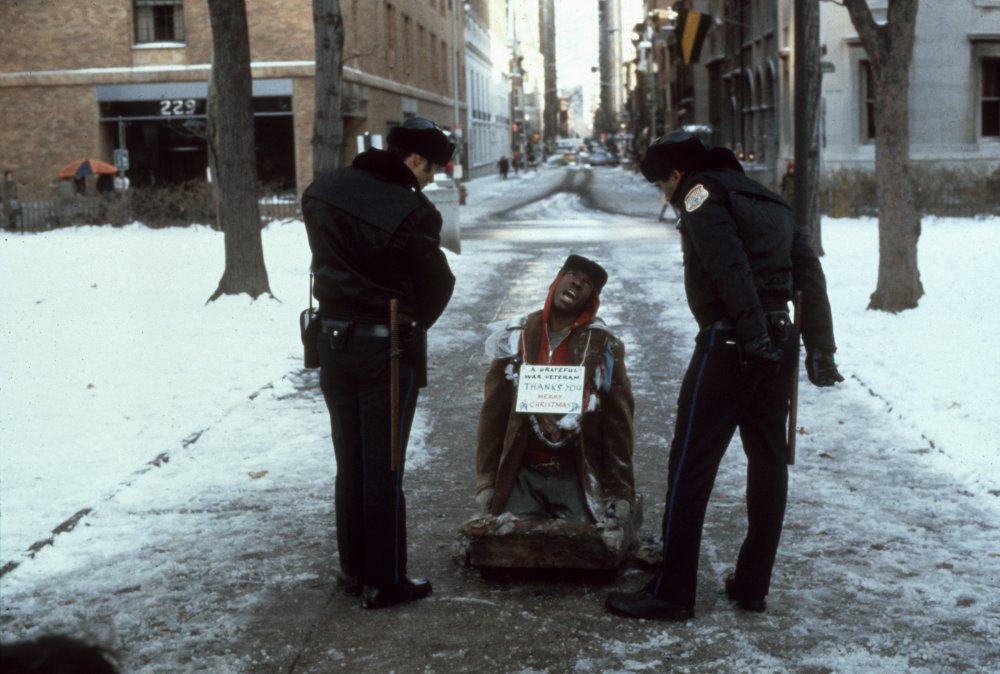
What do the Russians think of Biden?

 sputniknews.com
sputniknews.com

Video of Biden Pondering On Putin's 'Invasion of Russia' Goes Viral
Biden’s remark elicited a wave of mockery from a number of social media users, some of whom made disparaging remarks about the POTUS.
And it's Alac Baldwin in the top pic.ROFL!! That's Eddy Murphy in the bottom picture. 1980's movie "Trading Places"
What a retardWhat do the Russians think of Biden?

Video of Biden Pondering On Putin's 'Invasion of Russia' Goes Viral
Biden’s remark elicited a wave of mockery from a number of social media users, some of whom made disparaging remarks about the POTUS.sputniknews.com
Probably a naval blockade.What would we/the USA be doing if that was happening to our southern border?
The only confounder I see is many if these “deepstate” types, majority democrats, are the ones pushing, instigating and backing the Kiev Ukrainians to act. The same one who were mostly bashing those I would consider true Americans here and supporting the 2020 riots riots at home. Using all of their media outlets to parrot the same narrative. Mostly peaceful bullshitEuromaiden protesters were protesting being subjugated by another Putin puppet, Yanukovich.
Imagine we had a Russian puppet in the WH “elected” after a rigged election (hmmmmmm).
The Ukrainians did more to overthrow their puppet Russian president and sent him back to Russia in Feb 2014.
Biden is also a Russian puppet and has been since no later than 1972 when they financed his campaign into the Senate in Delaware as part of the Active Measures campaign to fill the Senate with secretly-compromised politicians, so they could get the US to sign pro-Soviet legislation that would further disarm the US (SALT II treaty-Joe Biden was its biggest sponsor). The reason for this was because the Senate is the International Treaty Signatory body of the US Congress.
Crimea has been depopulated and replaced with ethnic Russians for moments like this in history, over a period of centuries.
I am very much in the Kyle Rittenhouse camp.
The rioters in the US were part of the Soviet BLM/ANTIFA movement, which is an evolution of the former SDS/Weathermen Underground, which Bill Ayers was a member of if you recall. Comrade Obama launched his political camping from Comrade Ayers’ apartment.
Trump sent Javelins to Ukraine as a deterrent after Putin invaded with Obama’s blessing in 2014.
If you understand the history and who all the actors are loyal to, it will make sense, but it takes some studying.
But when you look at 2013-2014, the Ukrainians absolutely had more stones than the US and forced their Kremlin puppet out. Since the Soviets co-opted the FBI, CIA, DoD, who knows how much of Congress, the Senate, etc. from the 1930s-present, they have a lot of infrastructure within the US to squash any uprisings against the mass of traitors in DC, and use the IOJ-Mockingbird media to discredit anyone who is actually pro-American.
Trump did indeed push for actually arming the Kiev Ukrainians. Where Obama and Biden both hesitated. I believe Trump also told Putin if he made moves he would not hesitate to act, so he didn’t.
With Biden in the white house the sharks smell blood. Biden will bribe, sanction and politic... but when push comes to shove he will not make the aggressive call, instead create an unnecessary conflict through his weakness. I guess my point is don’t start shit there won’t be no shit and if you’re gonna start shit you better be ready to roll.
so i see a ton of pundits saying now that if you talk any shit on biden instead of putin, you are a traitor.
is there any better proof that this is a wag the dog distraction from xiden's failures?
is there any better proof that this is a wag the dog distraction from xiden's failures?
Don't you mean, "Biden, Putin it in yo azz"?
I’d be Tulsi Gabbards cabana boy.
I guess some would understand this kind of logic more easily aka american way of doing things... aka simpleton way.
Twice in a Century: Russia Faces a War of Annihilation
A war of annihilation is a war in which the goal is the complete obliteration of the state and the extermination of its people. It is defined as a radicalized form of warfare in which 'all psycho-physical limits' are abolished and the strategic goals are pursued by any means necessary. It is...www.unz.com
The facts are US (NATO/EU are intentionally left as both are serfs and non-entities without "big(sugar) daddy") can't do anything, they bark, they make up sanctions others will pay, they pretend they bring world of hurt on Russia but in the end they do nothing of importance. More of a temper tantrum than anything else.
As to the elections in Kiev in 2014 or prior just a friendly reminder of ~80 000 000 votes for mr. Biden the most popular president in the history of United states and when you and your brothers find yourself staring at each other through weapon sights maybe then you'll have an idea of what people in Ukraine, Bosnia etc. went through and what is the typing masturbation you're doing in this thread worth...
And it's Alac Baldwin in the top pic.
Well I’ll be darned if you’re not right on that. I didn’t see that until now. I really need new glasses.
First prize goes to the one who put Piglosi or AOC in a staged photo!
just to be "fair" and show something not from cnn
and in all that type...i STILL didnt see one fucking reason for america to get involved....i mean to say, involved any FURTHER into the quagmire of shit and corruption that they had a large part in creating.Moscow was fortified by Kievan Rus Yuri Dolgoruki, so Moscow is really Kiev’s ancestral territory if you go by that.

A lot of you guys looking for a neat and tidy little package to wrap your heads around this subject can’t have that easy pill solution, because it doesn’t exist. You really need to understand far more about the history and region before you can even begin to catch up to the events over the last 100 years.
Russian false flag operations commenced in 2014 on Donbas after Ukrainians ousted Putin’s puppet, Yanukovich, who went against the will of the people by signing onto the new Russian Economic Union that Putin proposed to be his answer to the Eurozone.
Saying that Ukrainians deserve to be shelled and skull-dragged by Russia for having a history of corrupt Kremlin puppets installed over them means that you also are OK with the same being done to you for electing a geriatric pedophile, whose son was eyeball-deep in the Russian plot to control energy in Ukraine with Burisma, which his kiddy-diddler father openly bragged about getting Viktor Shokin fired over to stop the investigation.
Ukraine after Putin Puppet Yanukovich was ousted, was trying hard to get their industry and government above-board enough to be on favorable trade status with the EU. Obama and Biden helped Putin kill that effort, and now you pass judgement on all of Ukraine for this.
Some of you should really not post until you educate yourselves on the facts and history of the region. It’s especially bad when you have zero knowledge of the geography and demographics, but are using after-the-fact social media memes to form your opinions.
If you follow the timeline, a very good understanding of this series of events will unfold before you, and you will be able to sift through disinformation much better. Disinfo and propaganda are normal actions from all sides in conflict, nothing new. You just see more of it in the Information Age.
"According to Rossi, those who managed to get out of the base before the attack survived. “There were special forces soldiers from all over the world. The information we have is that everyone died. They [Russians] ended it all. You don't understand, it's over, it's over. The Legion was wiped out in one fell swoop. I had no idea what a war was,” said Rossi"
oh? special forces, you say? $20 says a whole lot of embellishing went on about their actual achievements. one of the first lessons is "don't congregate". guess they either never learned it, or forgot that. "special forces"....uh huh. yup.
so these larpers found out that it isnt like the internet, where your actions usually dont have any consequences? i wonder if they are still standing around waiting to respawn?
Not so much fun when the other guys have artillery and you don't have a chopper to get you out of there. I have to give props to the ukrainian soldier guys because they are definitely fighting from a disadvantaged position.
i still do not have, not one single fuck to give about any of that shit.Big negative on that one. I lived there for quite a while, in multiple cities, have studied the region and history all my life since my family is from Finland.
Russia is basically a medieval knightdom that had intermittent and limited exposure to the stages of the industrial revolution because it’s land-locked and frozen almost year-round. It’s a very gloomy, depressed place after being ruled by regional warlords, invaded by everyone from Genghis Kahn to Hitler, and subverted by secular statists with the Czars, demonic apostates under a communism dictatorship, with a hybrid black market/centrally-planned economy trying to hold it all together. Now it’s under rule by former KGB oligarchs who confiscated all the most lucrative industries that survived the collapse, namely the oil, natural gas, and mining enterprises.

They used to have large families pre-Soviet times in the peasant farming villages, but with industrialization under Soviet Socialism, millions were aggregated in the cities under the Czarist attempts at industrialization, then the apartment complexes in the Krushchev era, and those apartments are still standing to this day, utter eyesores if you’ve ever seen one. They were only supposed to last 5 years until better solutions could be hatched by "glorious people’s revolution” in the wake of purging the system of talented designers, construction professionals, brokers, and other “bourgeois” class who ended up dead or in gulags.


When they did have traditional farming families and the dominance of the Russian Orthodox Church since 1721, it was still a depressed society with no real vigor or piety in them, just the reservation to living a simple life condemned to the long winters and hope that a strong leader would navigate them through the border troubles with rival empires. Under Peter the Great, the Russian Orthodox Church was made subordinate to the Czarist state as a functionary for managing the populace, much as was done with Roman Catholicism in Central Europe hundreds of years prior to that.
When the Godless apostate communists were financed by Germans and international banks to get Russian empire troops out of Central Europe during The Great War, the Czars even contributed to their own demise by penetrating the Bolsheviks in attempts to co-opt them to get control of the various revolutionary movements that had sprung up in the late 1890s. If you study the history of Okhrana (Czarist-era secret police), they were agent provocateurs inside the Bolsheviks well before 1917.

The Bolsheviks targeted the Russian Orthodox Church and initiated a campaign of mass executions, extrajudicial killings of priests and clergy. Lenin spoke out against Okhrana’s tactics, then embodied their exact same methods when they became the Communist Cheka, MVD, and NKVD secret police during and after the Russian Civil War. Survivors of the purges and murders of Russian Orthodox Church were subverted as collaborators with the Bolshevik revolution to act as spies and hubs to keep track of the citizenry, after the Bolsheviks accused the ROC of supporting the White Nationalist Russians who wanted to retain the Czars.
The upper class had some more traditional values in the autocracy, while the peasant slavs were subsistence farmers transitioning into labor factories. One of the main calls to action and agitation by the revolutionaries was labor conditions, but there was a lot of propaganda with this messaging at the time that drove public perceptions not only in Russia, but in Europe and the US as well.

If you’re trying to find a puritan-style farming family life in Russia, it’s just not a reality I’ve been able to find historically, and is uniquely a US thing. One exception would be in Ukraine under Prussian-born Czar Katherine II, when Mennonite farmers moved into Western Ukraine to harvest the land and live there, after being subjected to religious persecution in Prussia and Poland in the mid 1700s. Katherine II invited them in with incentive decree from 1763-1764. These are from the Anabaptist movement who were persecuted by the major church-states at the time, who were utterly corrupt.
During the Soviet Times, the ROC became an arm of the state, similar to how it had under Peter and the Czars, but now under communist rule. Once Yeltsin announced Putin was surprise, the new President on Dec 31, 1999, Putin worked to create an image of being aligned with the ROC, but it was business as-usual.

When I lived with Cossacks for a week, who are their devout warrior class with their own monastery-like communities, they were watching Russian gangster movies in the communal eating room with all of its old metallic icons on the walls, reminiscent of medieval times pre-Renaissance from an art perspective. We went to mass at a local ROC church building in the town early one frozen morning and did the sign of the cross for 2 hours like a PT session, with a few older babushkas and people that still went to church, filed through past the priest at the end to kiss a giant golden cross, before heading back to the monastery. It was an interesting experience and I didn’t fully appreciate who I was even living with, not being as familiar with the Cossack traditions as I should have been.
The head Cossack running the place was some type of intel guy and a local police officer as well for his day job. They relied on food donations from the local community, so chow was pretty sparse but enough to sustain you. I actually would have like to stay with them longer just to get more familiar with them.
But I didn’t see any evidence of devout Christians as we would recognize them in the US. Catholics would be more able to relate with them and see a common apathy at best, with minimal mass attendance/lack of interest. I’m not judging anyone, just pointing out exactly what I experienced to the best of my ability.
If you see propaganda talking about Putin as some type of Christian crusader against globalists, it doesn’t pass the sniff test.
not. OUR. problem.
your humor not withstanding, they wouldnt even do that.Probably a naval blockade.
That missile strike was a very direct message to the rest of the world from Putin. Ukraine is now part of Russia again. Go there as an "insurgent", get killed. They are a conventional force, they can fuck everyone up from afar and have chosen so far not to do that to Ukraine. Free-wheeling larpers and wanna-be mercenaries get the treatment though.
Considering this is 30mm cannon i guess it would go tough and through that BMP1 at one point.
Both sides now packing Javelins and NLAWS,as captured gear gets Transferred to Donbas millitas. Russian manual on Javelin
Both sides now packing Javelins and NLAWS,as captured gear gets Transferred to Donbas millitas. Russian manual on Javelin
Attachments
Last edited:
Unfucking believable.
Some of y'all are trying to prove your education by writing big long history of two areas divided by an imaginary line on a map and coming up with some bullshit to the current events.
It's got nothing to do with two hundred year old history. It is about events of the last twenty years.
Here's a picture to make it simple.
View attachment 7828123
The USA and the EU were exploiting the orange area and teasing to turn it light blue. Arms, biolabs and a corrupted government on their border. Nothing more nothing less.
There was an agreement with the USA/NATO for a buffer zone and you can see that was broken. What would we/the USA be doing if that was happening to our southern border?
1963. For most here: history. For some: memories. Very .. vivid .. memories.
Thank you,
MrSmith
- Status
- Not open for further replies.
